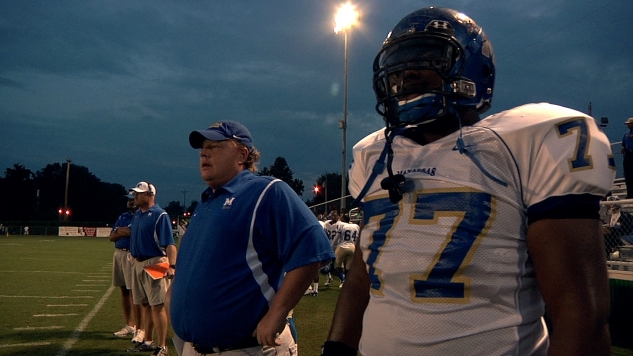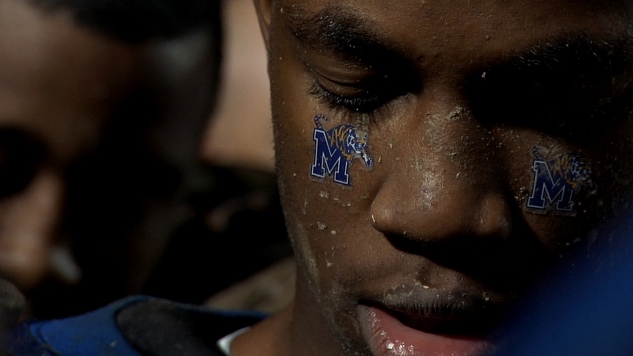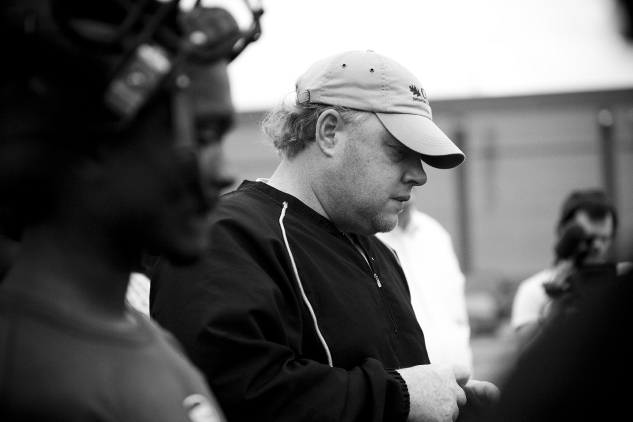Feature
Brother Bill Courtney (Mississippi) just wanted to coach football again. But when his life intersected with the players on one of the worst high school teams in the State of Tennessee, he not only helped the team turn things around on the field, he showed them where true character and manhood come from.
“Football doesn’t build character. Football reveals character.”
It’s a common refrain for Bill Courtney (Mississippi). And he should know, since he’s spent most of his life playing or coaching the game.
“In a lot of ways, football is a microcosm of life. There’s pain, triumph and loss. You have to work with other people and listen to someone else’s instruction. You have to learn the difference between hurt and injured. And when you get hurt, it sucks, but you still have to keep going. Those are all the same things that happen in everyday life, and how you respond does, in fact, reveal your preparation to deal with those things,” he says.
Ever since Undefeated — the documentary featuring Courtney and his role in turning around the Manassas High School football team in Memphis — won the 2012 Academy Award for Best Documentary Feature, Courtney has been invited all over the country for speaking engagements. He talks about leadership — as in, leading yourself and leading others — which is something he learned not only through football but also in Sigma Nu.
He regularly recalls what he first heard as a candidate: To believe in the Life of Love, to walk in the Way of Honor, to serve in the Light of Truth. “I remember thinking, ‘That’s an amazing creed; that’s something worth thinking about and implementing in your life. If you could just take that creed and walk the rest of your life doing those three things, by and large, you’d be successful.’ Those words have always meant something to me,” says Courtney.
As he coached the Manassas Tigers from 2003 to 2009, Courtney closed every team prayer with this challenge from the Sigma Nu Creed. It made no difference that the players didn’t know where those words originated; they still provide the guidance a young man needs in deciding how to live his life.
Before He Was “Coach”
For as long as he can remember, Courtney played sports, especially football. Raised in a single-parent home — Courtney’s dad left when he was just four years old — the only male role models he had were his coaches and teachers.
He lettered in six sports and played competitive chess in high school. He describes himself as “a fair athlete but pretty bright.” At the time, that didn’t necessarily seem like a good thing to Courtney. But one of his mentors, the chess coach and math teacher, had also played football in high school; he showed Courtney that being smart wasn’t necessarily weak. Courtney joined the chess team his freshman year, and four years later they won third place in the national tournament. “I learned a lot of valuable stuff from him. It was guys like him and my other coaches who formed my thinking as an adolescent,” he says.
Courtney was recruited out of high school to play football at several smaller colleges; but Ole Miss offered an academic scholarship. He accepted and planned to walk-on the football team, but six days before tryouts he separated his shoulder. And, as it turns out, once he saw the skill level of the guys on the team he knew he wasn’t good enough to play with them. “I just wasn’t that caliber of an athlete,” he says.

When Courtney graduated with a degree in psychology and English, he decided to be a teacher and continue coaching. By the age of 22, he was a head varsity football coach, the youngest in the state of Tennessee.
So he got involved in other things during college; he wrote for the student paper and joined Sigma Nu, where he served as Lieutenant Commander in 1989. “What I remember most about Sigma Nu is living in the house and the relationships, fun and the understanding of people that I developed there,” says Courtney. He also played a key role in launching Epsilon Xi’s renowned Charity Bowl, which has raised more than $1.2 million since its inception. (See the sidebar about the history of the Charity Bowl.)
During his junior and senior years of college, Courtney coached soccer at Oxford High School and soccer, baseball, swimming, track and basketball at a private school, Oxford University School. When he graduated with a degree in psychology and English, he decided to be a teacher and continue coaching. By the age of 22, he was a head varsity football coach, the youngest in the state of Tennessee.
Once he got married, Courtney couldn’t afford to keep teaching and coaching. In 2001, he started a lumber business out of his living room. Classic American Hardwoods, Inc. sells lumber to companies that manufacture flooring, cabinetry, trim and furniture. His company, now with 120 employees and offices all over the world, is headquartered just blocks from Manassas High School near some of Memphis’ most underprivileged neighborhoods.
Building a Promising Football Program
It was two years later when an employee and fraternity brother Jim Tipton (Mississippi) had been volunteering at Manassas and asked Courtney if he was ready to get back into coaching. Tipton said there were 17 kids on the football team, some of whom looked promising; but in the last three years, they’d won only a single game. Courtney saw it as a challenge. “I didn’t go there to save anyone,” he says. “I went there to coach football. But it didn’t take long to realize the inherent dysfunction of those kids’ lives. That’s what turned ‘I’ll try it for a year’ into a six-year exercise.”
In his first year at Manassas, the Tigers won four games and went to the playoffs. Every year after that, the more success they had the more the program grew in terms of team members and local volunteers. And, at the same time, Coach Courtney fell in love with the perseverance of these kids who’d faced more than their share of hard knocks primarily because of where they’d been born.
According to Courtney, an 18-year-old male from the neighborhoods around Manassas is three times more likely to be incarcerated than go to college by the time he’s 22 years old. Most of the kids he coached didn’t have a father at home; many had at least one relative in prison. They were hungry to learn about life and how to be a man. Courtney understood those desires; he’d faced them growing up without his father.
“I was able to say to them, ‘I know where you are. I came from where you are. I may be a white guy with a business and all that, but I really do understand what’s hurting you and what’s driving you. I was there; and if I can do it, you can do it,’” he says.
But he also knew from experience that “doing it” wasn’t something that happened in a vacuum. “The Lord put some unbelievable men in my life in the form of coaches. I don’t think I would be a third of what I am today if it weren’t for the men I played ball for, and that goes all the way back to elementary and junior high school,” he says.
Remembering that, Courtney knew he had an opportunity to reach these kids through something they cared about — football. Aligned with his mantra that “football doesn’t build character” he set out to help them figure out what does.
Committed to Character
What builds character? For Courtney, it’s living out those words he learned as a candidate. “It’s a commitment to integrity, hard work, honor and keeping your word. All of that comes straight out of the Sigma Nu Creed. The guy who wrote that meant it. The whole idea is to think about those words and make them a part of who you are. That’s where you build character. So when life hits you in the mouth, what you’ve built is revealed in how you handle those circumstances. The game doesn’t build character, but it will certainly reveal it.”
Day after day of hard work on the field and encouraging his players to keep their focus in the classroom, Courtney and his fellow coaches modeled what it means to be men of character. After reading Tony Dungy’s book Uncommon, Tipton introduced “The Uncommon Man Award” to help team members recognize the importance of doing well on and off the field. Every week, during their devotional time with the team, Tipton read a chapter from the book. The player who most illustrated what it means to be “uncommon” over the last week received the award before the pre-game meal.
Building a team of uncommon men wasn’t going to happen overnight; and it certainly wasn’t going to happen without help. Over time, at least 200 other volunteers served at Manassas in one way or another. Courtney eventually gathered a full staff of volunteer coaches; and members of local churches cooked pre-game meals, sent mentors to campus and hosted football camps for the team. “Every day it seemed someone new was asking how they could help at Manassas. Over the course of six years, with so many volunteers surrounding the team, it became a program,” he says.
And that program was attracting some attention. In Courtney’s sixth year, documentary filmmakers T.J. Martin and Dan Lindsay had heard about O.C. Brown, a promising lineman at Manassas; they wanted to create a 30-minute film about him. But once they saw the bigger rising-from-the-ashes story of the Manassas Tigers, they decided to temporarily relocate to Memphis to film the whole story. What resulted was an inspiring documentary that is well-illustrated by its title: Undefeated.

Most of the kids Courtney coached didn’t have a father at home; many had at least one relative in prison. They were hungry to learn about life and how to be a man. Courtney understood those desires; he’d faced them growing up without his father.
Not Just about Football
The film, however, isn’t just about a once-failing football team’s rise to success. Courtney would be the first to tell you there were far more lows than there were highs in those six years. Four of his players were shot and killed in the course of his time at Manassas. This was about far more than the game of football.
In his words, “Undefeated has nothing to do with what happens on the field. It’s about being undefeated by your circumstances, and this group of people was not going to be defeated by their circumstances.”
And, it seems, the “people” he’s referring to aren’t just the kids on the team. “This is about two very diverse groups of people from very different socio-economic walks of life who put aside their preconceived notions and social inhibitions and just came together to work for a common goal. That’s the beauty of it.”
But just like football, it was a combination of pain and triumph. Every bit of those six years with the team was excruciating as Courtney worked and coached 16 hours a day before coming home to spend a few moments with his family. But he says it was all worth it.
“The rewards were immeasurable as more kids came to the program, as they started to win on the field and as they started to change the way they were approaching their lives. In our last two years, we graduated 36 seniors, and 35 went to college. When you see change happening in kids’ lives, you’re absolutely drawn to it. That’s the satisfaction you get by giving of yourself,” he says.

“What builds character? It’s a commitment to integrity, hard work, honor and keeping your word. All of that comes straight out of the Sigma Nu Creed. The guy who wrote that meant it. The whole idea is to think about those words and make them a part of who you are.”
In those years Courtney changed, too. “Ten years ago I would have told you, if you don’t succeed in this country it’s your own fault. I’m here to tell you today, that’s just not true,” he says. “That sounds right, and it should be right. But the truth is, even in a country with all the opportunity in the world, until that opportunity is explained and that path is illuminated, you can’t expect a kid to just find it.”
To continue to help illuminate that path, Courtney and Tipton created The ManRise Foundation — a mentoring program for young men in Memphis schools. Mentors encourage morality, good character and responsibility through biblical principles and personal encouragement. Now that Courtney is no longer coaching at Manassas, several local churches continue to carry the torch and invest in the lives of the young people in Memphis through the foundation.
In 2003, he just wanted to coach football. A decade later, Courtney has a platform to spread the word about what it takes to impact the life of another human being. “All the money in the world is never going to fix this problem [of poverty]. This is a very human problem. The only thing that fixes it is in-your-face compassion, mentoring, real-life love and teaching about the healthy ways to live life. These kids are lost. But you light that human spirit with a little bit of hope and a little bit of guidance; and it’s amazing what can happen.”
And all it takes — is character.
Undefeated is currently available on DVD, Blu-Ray and Netflix streaming.
Photos courtesy of TJ Martin/The Weinstein Company